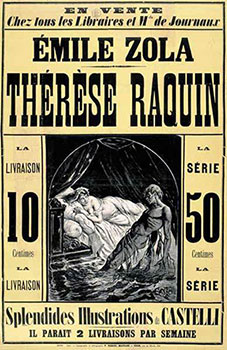´

(This image is in the public domain.)
- Thérèse Raquin - Study the interior spaces presented in the novel: choose two or three and analyze how they shape their inhabitants or how we come to understand the author’s sense of the organic relationship between who we are and how we live.
- In her article on love triangles, Ethel Person says: “Romantic love has been described as a religion of two, but love pairs can be infected by triangles and may even be wholly contaminated by them. Or, more positively, triangles may sometimes help love along: Some pairings first crystallize in the context of a triangle.” In both Thérèse Raquin and Dom Casmurro mothers provide a triangle that either motivates or crushes love. Analyze the role of the mother in one of these novels and argue that her presence, attitudes, prejudices either make love more desirable or suppress the connection in a couple.
- In Dom Casmurro we do not know whether Bento’s jealousy is warranted or an after product of his character. Use moments from the novel to argue either case: that Capitú was unfaithful or that Bento’s world-view is so distorted and his moods so changing that he was incapable of trust.
- In Thérèse Raquin the characters’ physiological state/genetic character is intimately linked to how they confront the world. Choose one or two characters and analyze the language Zola uses to describe them. Argue that the entire evolution of the character’s role in the novel is determined by traits over which they have little control.
- Obsession is a sentiment that drives the action in both Thérèse Raquin and Dom Casmurro. Choose any character from either of these novels and argue that he/she was incapable of controlling his/her various obsessions either because of genetic, or circumstantial, environmental factors. Use textual references to build your case.
- Of course if you’d like to design your own topic, that’s fine, but please check with me first to be sure it is an arguable thesis.
